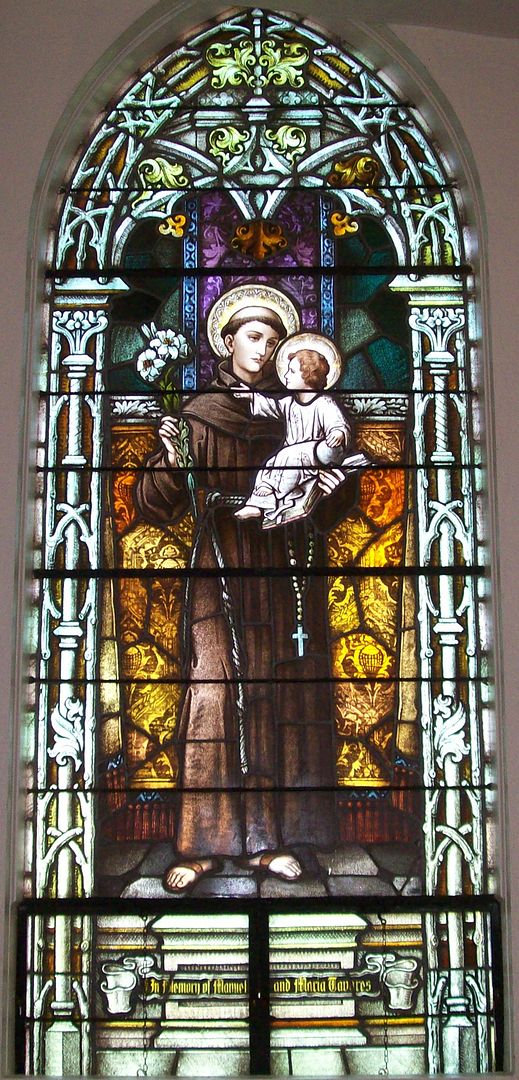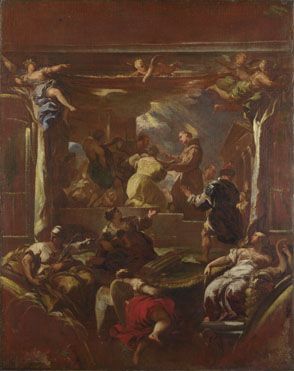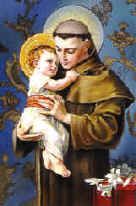Today, June 13, we celebrate the feast of Saint Anthony of Padua (1195-1231), Doctor of the Church, Confessor, Franciscan friar, and patron saint of lost items, travelers, and the poor. Saint Anthony’s life is one of preaching, writing, and prayer. He was canonized less than one year after his death, demonstrating the respect and veneration the Church held him in. In canonizing Anthony in 1232, Pope Gregory IX spoke of him as the “Ark of the Testament” and the “Repository of Holy Scripture.” In 1946 Pope Pius XII officially declared Anthony a Doctor of the Universal Church. Based upon his unending love for the Lord, the Church wants us to learn from Saint Anthony the meaning of true wisdom and what it means to become like Jesus, who humbled himself for us and served others without hesitation. Saint Anthony of Padua remains one of the most beloved and admired saints of the Church.
Below, Fifteen Teachings on Christ by Saint Anthony of Padua (as published in: Anthony: Words of Fire, Life of Light, by Madeline Pecora Nugent, published by Pauline Books).
First Teaching
A wedding celebrates the union of two people, a bride and a groom. Many times weddings are arranged between two contending families to produce peace between them, the man taking a bride from his rival’s family. In the human race, dissension existed between God and humanity. God wished to establish peace. All the messengers and legates sent by God could do nothing, so God the Father consented to send His Son who united Himself to our human nature in the womb of the Virgin Mary. Thus the union of God and man was complete in the Son. Two disparate natures joined. In Christ, we are granted union with the Father, forgiveness of sins, and a share in eternal life.
Second Teaching
The first day of creation represents the Incarnation of our Savior. Without our Savior, we would be faithless and lost. Without light, our world would not exist. The light is Christ, ‘Who dwells in unapproachable light’ and ‘gives light to every person coming into the world.’ When the Father said, ‘Let there be light,’ He was also speaking of His Son’s Incarnation. St. John expresses this more succinctly: ‘The Word became flesh and made His dwelling among us.’ When Ezekiel writes ‘the hand of the Lord came upon me,’ he is referring to the Son in Whom and through Whom the Father created all things. God said, ‘let there be light,’ and the Light of the world was born of the Virgin Mary. ‘The darkness which covered the abyss,’ that is, the hearts of men, was dispelled.
Third Teaching
After Mary and Joseph found Jesus in the temple, ‘He went down with them and came to Nazareth, and was obedient to them.’ Let all boasting cease, let all impudence disappear in the face of these words. ‘He was obedient to them.’ Who was He Who was obedient? He who has created everything from nothing. He ‘Who,’ as Isaiah says, ‘has cupped in His hand the waters of the sea, and marked off the heavens with a span; Who has held in a measure the dust of the earth, weighed the mountains in scales and the hills in a balance.’ ‘Who,’ as Job says, ‘shakes the earth out of its place, and the pillars beneath it tremble; Who commands the sun, and it rises not, Who seals up the stars; Who alone stretches out the heavens and treads upon the crests of the sea; Who made the Bear and the Orion, the Pleiades and the Constellations of the south; Who does great things past finding out, marvelous things beyond reckoning.’ He Who does all these things, ‘was obedient to them.’ Whom did He obey? A carpenter. And a poor, humble virgin. He Who is the Beginning and the End, the Ruler of angels made Himself obedient to human creatures. The Creator of the heavens obeys a carpenter, the God of eternal glory listens to a poor virgin. Has anyone ever witnessed anything comparable to this? Has any ear heard anything like this?
Fourth Teaching
We receive God’s forgiveness. Then we are worthy to receive in abundance at the table of the Eucharist where ‘you cannot be partakers of the table of the Lord and of the table of devils.’ For God and demons are enemies, and those who do not serve the One surely serve the other. At which table do you wish to be seated? The food served at the first table, the table of doctrine, is the word of life. The feast at the second table of penance is the food of groanings and tears. The meal at the third is the Body and the Blood of Christ. Must you choose your table? No! God calls you to all three! So come like children ‘around the table,’ seeing all that God has to offer, taking all that God wishes to give you. Come. Believe firmly. Approach reverently. Admit the unworthiness of such great grace given to you. Eat of the tables of God with humility. Oh, Christ, may we nourish ourselves at Your three-fold table so joyfully, humbly, and trustingly that we may merit to be nourished at Your eternal table in heaven. Amen.
Fifth Teaching
The Son, obedient to His Father’s bidding, ran to meet death, death on a cross. Therefore, ‘He stood with His hands outstretched’ on the cross ‘between the living and the dead.’ He was stretched between two thieves, one of whom was saved and the other condemned; He stood between those who were being kept in prison in the netherworld and those who were living in the miseries of this world’s exile. All of these the Son delivered from the diabolic persecution when He offered Himself to the Father in the sweet fragrance of sacrifice. In His arms outstretched on the cross, Christ gathers us. He lifts us to the bosom of His mercy as a mother takes her child. He nourishes us with His Blood as if it were milk. And He has carried us in His arms extended on the cross. Therefore, rejoice because Christ has died for you.
Sixth Teaching
Let us raise our eyes and fix them on Jesus crucified, the author of salvation. Let us contemplate our Lord pierced with nails and suspended from the cross. How can you not believe when your life is hanging before you from the cross? What is more important than a man’s life? The life of the body is the soul and the life of the soul is Christ. Here, then, your very life hangs from the cross. How can you not feel any pain? How can you refuse to identify yourself with His suffering? If Christ is your life, as He truly is, how can you keep from following Him, ready with Peter and Thomas to be thrown into jail and to die at His side? Christ hangs from the cross before you to invite you to share in His suffering. He never stops calling to us, ‘Come, all you who pass by the way, look and see whether there is nay suffering like My suffering.’
Seventh Teaching
Your life hangs before you on the cross so that you might see yourself as in a mirror. You can see thus how serious were your wounds and that they can be healed by no other medicine than by the Blood of the Son of God. And, if you pause to reflect deeply, you can also come to understand how sublime is your dignity. How lofty is the greatness of your human person for which it was necessary to pay so incalculable a price. The ‘mirror’ of the cross shows you what you are in the present; it teaches you to what depths you must lower your pride, how you must mortify the desires of your flesh, how you ought to pray to the Father for those who persecute you, and place your spirit in His hands.
Eighth Teaching
O Lord, our protector, look upon the face of Your Anointed. O Lord, do not look upon our sins, but look at the face of Christ, Your Anointed, covered with spittle, swollen with bruises and covered with tears on our behalf. Have mercy on us, O Lord, because of the face of Christ. Be merciful to us who have been the cause of His suffering.
Ninth Teaching
The apostle John tells us that, following Christ’s resurrection, ‘when the doors were shut where the disciples were assembled, Jesus came and stood in their midst and said to them, ‘Peace be with you.’ When He had said this, He showed them His hands and His side. It is my opinion that Christ showed the apostles the wounds in His hands, feet, and side for four reasons. First, He showed the wounds to prove to them that He had really risen. By showing His wounds, Jesus intended to demonstrate that the faith of His disciples had nothing to do with current or popular opinion about Him. It had nothing to do with theories or interpretations of Scripture. Faith was based instead on the direct knowledge and experience which His followers had gained through their familiarity with Him. By showing His wounds, He wished to remove all doubt from their minds.
Tenth Teaching
Second, He revealed His wounds to the Church and faithful souls because within those wounds is a place of refuge. Just as a dove builds its nest in a safe place to protect itself against the attacks of a hawk, so Christians find shelter from the attacks of the devil by constructing for themselves a nesting place within the wounds of Christ. Third, Christ showed His wounds to impress on our hearts the signs of His sufferings and, fourth, to evoke in us compassion so that we would not crucify Him again with the nails of our sins.
Eleventh Teaching
Jesus said to Simon Peter, ‘Simon, son of John, do you love me more than these?’ Jesus did not ask Peter the question only once, but a second and a third time. ‘Simon, son of John, do you love me more than these?’ Three times the Lord heard Peter answer that he loved Him. ‘Yes, Lord. You know that I love You.’ Why, you may ask, did Jesus ask three times instead of only once? Because Peter had thrice denied his Lord. Now he three times proclaimed his love. Peter’s threefold admission of love parallels his triple denial. Peter thus shows that the tongue ought to be prompted no less by love than by fear.
Twelfth Teaching
Jesus told Peter, ‘I will entrust to you the keys of the kingdom of heaven.’ Peter the rock was made head of the Apostles and of the universal Church. He was entrusted with the power to bind and to loose. What is this power? It is the ability to distinguish the worthy from the unworthy and the power to admit the former and to exclude the latter from the kingdom of God. Although the whole Church has power in its priests and bishops, although all the priests and bishops must feed the flock, God gave power and mission to Peter in a special manner. ‘Peter, do you love Me more than these?’ In his submission to God’s will in leading all the faithful to eternal life, Peter has given his answer. O Lord, in unity of faith and communion with the Church, may we be absolved from sin and enter into heaven. Amen.
Thirteenth Teaching
To the ends of the earth, O preachers, proclaim this word of joy. Proclaim it not only to the just who are in Christ’s midst, but to the outer bounds of the earth. Proclaim it to those who are outside the bounds of the Church, outside the precepts of the Lord within which we must live. Let the world hear the word of joy so that all people might obtain the full joy which has no bounds.
Fourteenth Teaching
When God dwells in the soul, the soul becomes even more beautiful. For who can be more blessed or more happy than the one in whom God has set up His dwelling place? What else can you need or what else can possibly make you richer? You have everything when you have within you the One Who made all things, the only One Who can satisfy the longings of your spirit, without Whom whatever exists is as nothing. O Possession Which contains all things within Yourself, truly blessed is the person who has You, truly happy whoever possesses You because he then owns that Goodness which alone can make the human mind completely happy.
Fifteenth Teaching
But, dear God, what can I give to come to possess You? If I give away everything, do You think that I will have You in exchange? You are much higher than the highest heavens. You are deeper than the deepest abyss, longer than the longest distance, wider than the widest ocean. How then can I, a worm, a dead dog, a tiny flea, a son of man, come to possess You? Job rightly says, when he speaks of divine wisdom, ‘It cannot be valued in the gold of Ophir, in precious onyx or sapphire. Gold and glass cannot equal it, nor can it be exchanged for jewels of fine gold. . . the price of wisdom is beyond pearls.’ O Lord God, I do not have these riches; what, then, can I give to possess You? O Lord, I already know Your answer. ‘Give me yourself,’ You say, ‘and I will give you Myself. Give Me your mind and you will have Me in your mind. Keep all your possessions, but only give Me your soul. I have heard enough of your words; I do not need your works; only give Me yourself, forever.
















No comments:
Post a Comment
Thanks for leaving a comment. If you wish to submit a prayer request, however, please do so above, using the "Contact" tab.